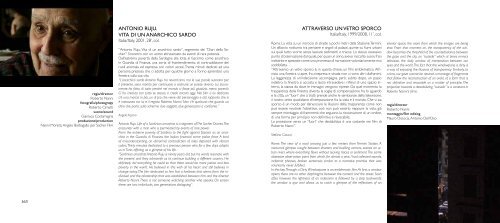Catalogo-Lucca-Film-Festival-Europa-Cinema-2015
Catalogo-Lucca-Film-Festival-Europa-Cinema-2015
Catalogo-Lucca-Film-Festival-Europa-Cinema-2015
Create successful ePaper yourself
Turn your PDF publications into a flip-book with our unique Google optimized e-Paper software.
egia/director<br />
Roberto Nanni<br />
fotografia/photograpy<br />
Roberto Cimatti<br />
suono/sound<br />
Gianluca Costamagna<br />
produzione/production<br />
Nanni Moretti, Angelo Barbagallo per Sacher <strong>Film</strong><br />
ANTONIO RUJU.<br />
VITA DI UN ANARCHICO SARDO<br />
Italia/Italy, 2001, 28’, col.<br />
“Antonio Ruju. Vita di un anarchico sardo”, segmento dei “Diari della Sacher”:<br />
l’incontro con un uomo attraversato da eventi di rara potenza.<br />
Dall’estrema povertà della Sardegna alla lotta al fascismo come anarchico<br />
in Guardia di Finanza, una sorta di fraintendimento, di contraddizione dei<br />
ruoli anomala ed espressa con colori accesi. Trenta minuti dedicati ad una<br />
persona preziosa che ci adotta per qualche giorno a Torino aprendoci una<br />
finestra sulla sua vita.<br />
“L’anarchico sardo Antonio Ruju ha novant’anni, ma le sue parole suonano per<br />
il presente, sono monito per continuare a costruire un paese diverso. Lui sicuramente<br />
ha fatto di tutto perché nel mondo ci fosse più giustizia, meno povertà.<br />
Ci ha creduto con tutto se stesso, ci crede ancora oggi. Nel film a lui dedicato<br />
c’è una marcia in più, un di più che viene dal personaggio e dal rapporto che si<br />
è instaurato tra lui e il regista Roberto Nanni. Non c’è qualcuno che guarda un<br />
altro che parla: sullo schermo due soggetti, due generazioni a confronto.”<br />
Angela Azzaro<br />
Antonio Ruju. Life of a Sardinian anarchist is a segment of The Sacher Diaries. The<br />
encounter with a man who is permeated by events of rare power.<br />
From the extreme poverty of Sardinia to the fight against fascism as an anarchist<br />
in the Guardia di Finanza, the Italian financial crime police force. A kind<br />
of misunderstanding, an abnormal contradiction of roles depicted with vibrant<br />
colors. Thirty minutes dedicated to a precious person who for a few days adopts<br />
us in Turin, offering us a glimpse of his life.<br />
“Sardinian anarchist Antonio Ruju is ninety years old, but his words resonate with<br />
the present and they admonish us to continue building a different country. He<br />
definitely did everything he could so that there would be more justice and less<br />
poverty in the world. He believed in this with all his heart and still believes in<br />
change today. The film dedicated to him has a liveliness that stems from the individual<br />
and the relationship that was established between him and the director<br />
Roberto Nanni. There is not someone watching another who speaks. On screen<br />
there are two individuals, two generations dialoguing”.<br />
ATTRAVERSO UN VETRO SPORCO<br />
Italia/Italy, 1999/2008, 11’, col.<br />
Roma. La vista su un incrocio di strade a pochi metri dalla Stazione Termini.<br />
Un affaccio notturno tra persiane e angoli di palazzi, quinte su fiumi urbani<br />
sui quali tutto scorre senza lasciare sedimenti o tracce. Lo stesso ossessivo<br />
punto d’osservazione dal quale, per quasi un anno, avevo raccolto suoni, frasi<br />
indistinte e spezzate come una promessa di narrazione volontariamente mai<br />
soddisfatta.<br />
“Attraverso un vetro sporco è, in questa chiave, un film emblematico. All’inizio<br />
una finestra si apre, fra cinepresa e strada non vi sono altri diaframmi.<br />
La leggerezza di un’indecisione accompagna però, subito dopo, un passo<br />
indietro: la finestra si accosta e lascia intravedere i riflessi di uno spazio interno,<br />
la stanza da dove le immagini vengono riprese. Da quel momento la<br />
trasparenza della finestra diventa la soglia di compensazione fra lo sguardo<br />
e la città, un “fuori” che a tratti prende anche le sembianze della televisione,<br />
il nostro vetro quotidiano d’interposizione fra la vista e il mondo. Che vi sia<br />
sporco è un modo per denunciare le illusioni della trasparenza: come non<br />
può essere neutrale l’obiettivo, così non può esserlo neppure la vista, già<br />
sempre montaggio di frammenti che seguono la ricostruzione di un ordine,<br />
di una forma per principio non definitiva e revocabile.<br />
La proiezione verso un “fuori” che destabilizza è una costante nei film di<br />
Roberto Nanni”.<br />
Stefano Catucci<br />
Rome. The view of a road crossing just a few meters from Termini Station. A<br />
nocturnal glimpse caught between shutters and building corners, scenes on urban<br />
rivers where everything flows without leaving traces or sediment. The same<br />
obsessive observation point from which, for almost a year, I had collected sounds,<br />
indistinct phrases, broken sentences similar to a narrative promise that was<br />
voluntarily never fulfilled.<br />
In this key, Through a Dirty Windowpane is an emblematic film. At first, a window<br />
opens; there are no other diaphragms between the camera and the street. Soon<br />
after, however, the lightness of an indecision is followed by a step backwards:<br />
the window is ajar and allows us to catch a glimpse of the reflections of an<br />
interior space, the room from which the images are being<br />
shot. From that moment on, the transparency of the window<br />
becomes the threshold of the counterbalance between<br />
the gaze and the city, an “outside” which at times mimics<br />
television, the daily window of interposition between our<br />
eyes and the world. The fact that the windowpane is dirty is<br />
a way of exposing the illusions of transparency. Similarly, to<br />
a lens, our gaze cannot be neutral: a montage of fragments<br />
that follow the reconstruction of an order, of a form that is<br />
not definitive and revocable as a matter of principle. The<br />
projection towards a destabilizing “outside” is a constant in<br />
Roberto Nanni’s films.<br />
regia/director<br />
Roberto Nanni<br />
montaggio/film editing<br />
Mauro Diciocia, Antonio Dell’Oso<br />
163 164


